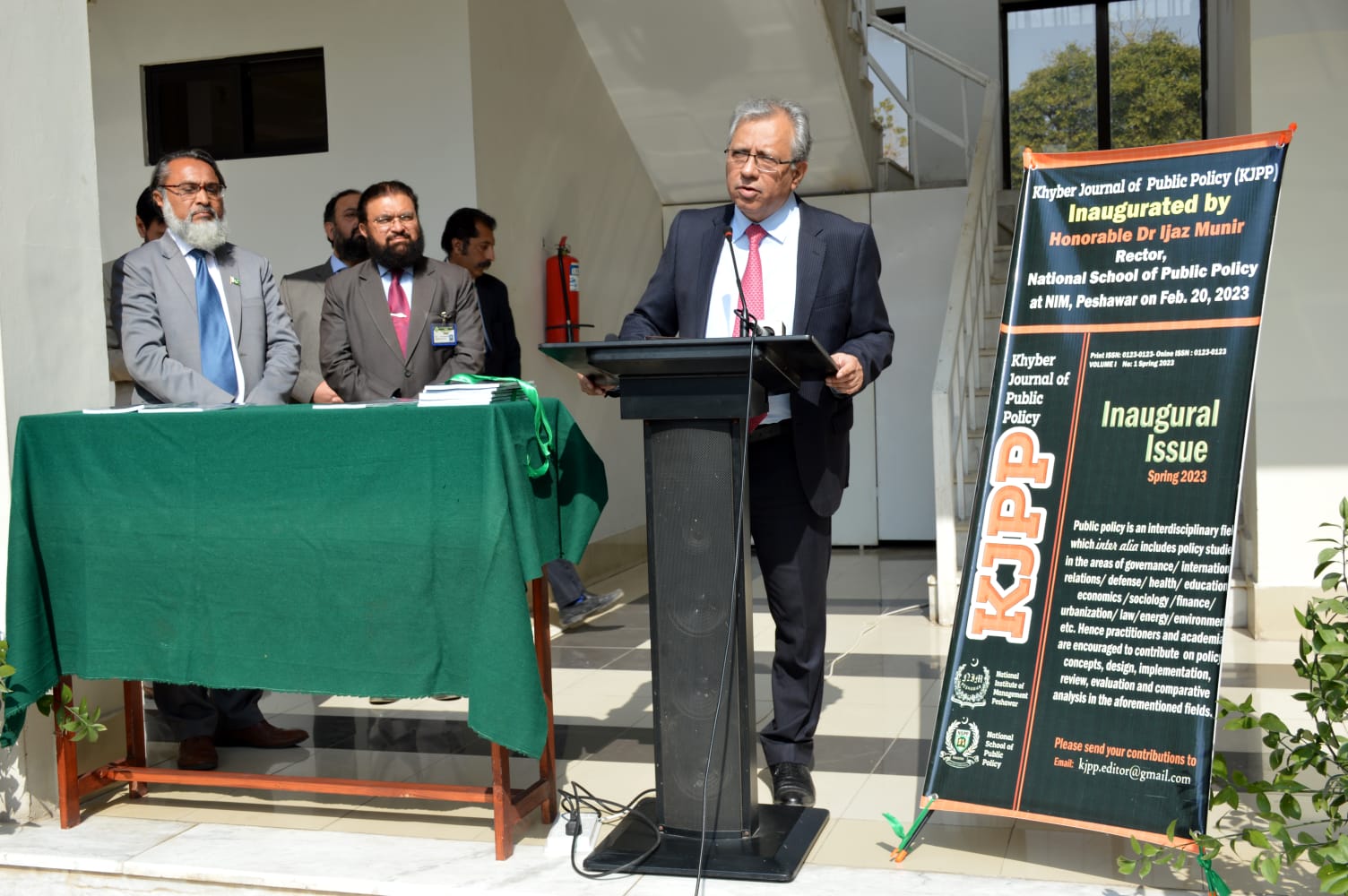The Khyber Journal of Public Policy (KJPP):
An Introduction
Administration (NIPA) Peshawar, a constituent unit of the National School of Public Policy (NSPP). NIPA Peshawar has been a center of excellence in capacity building and research since 1985, serving not only as a training institute but also as a think tank, generating hundreds of policy research documents, presentations, and simulations.
Researchers worldwide are actively engaged in analyzing policy design, implementation, and impact while proposing viable solutions to issues faced by various nations. The outcomes of policy research generated by academics and seasoned policy practitioners are valuable resources. These contributions deserve dissemination among scholars, professionals, and practitioners to encourage the adoption and implementation of policy recommendations. Innovative ideas and solutions addressing critical challenges significantly enrich the knowledge pool.
In alignment with the mission of the NSPP Act, the Khyber Journal of Public Policy (KJPP) aims to provide a platform for sharing these invaluable insights as ready references for practitioners and academics in public policy. The journal will adhere to the quality assurance and peer review procedures outlined by the Higher Education Commission (HEC), and recognition from the HEC and relevant international agencies is expected soon.
The launch of the quarterly Khyber Journal of Public Policy (KJPP), initiated by NIPA Peshawar with the support of Dr. Ijaz Munir, Rector of NSPP, and Capt (Retd) Usman Gul, Director General of NIPA Peshawar, marks a significant advancement in public policy research at both national and international levels. A Call for Papers (CfP) has been issued, and an editorial team of highly skilled public policy professionals has been appointed. NIPA Peshawar has a collection of policy papers prepared for publication, with the inaugural issue of the KJPP set to launch soon, by the will of Allah.
It is noteworthy that public policy is an interdisciplinary field encompassing studies in governance, international relations, defense, health, education, economics, sociology, finance, urbanization, law, energy, environment, and more.
In this context, NIPA Peshawar is honored to invite policy research papers related to these areas. For any clarifications or details, please contact the editor via WhatsApp at +92 343 5090648 or by email at muqeemz@gmail.com.
Dr. Muqeem ul Islam
(PhD, Public Policy & Governance, NDU)
Founding Editor, Khyber Journal of Public Policy (KJPP)
 Inaugurated by Dr ijaz Munir on Feb. 20, 2023
Inaugurated by Dr ijaz Munir on Feb. 20, 2023
Khyber Journal of Public Policy (KJPP): Areas of Interest and Invitation for Contributions
KJPP welcomes research that explores vital themes shaping the field of public policy, especially studies that illuminate sound policy design, evaluation, and implementation. Our goal is to build a foundation for scholarly and practical insights, grounded in enhancing governance and social well-being. We invite submissions that contribute fresh ideas, empirical findings, and theoretical perspectives to advance effective decision-making, strategic planning, and public service.
Core Areas of Interest
- Policy Analysis and Strategic Planning: Methods and tools for evaluating policy choices and improving planning and decision-making.
- Leadership and Management Essentials: Research on leadership and management skills critical for public sector roles.
- Public Finance and Budgeting: Insights into fiscal policy, budgeting, and resource allocation.
- Social Policy and Development Challenges: Studies addressing healthcare, education, welfare, and poverty for societal improvement.
- Ethics and Integrity in Governance: Discussions on ethical practices, accountability, and integrity frameworks.
- Public Policy Simulation Exercises: Simulations and case studies tackling real-world challenges in sectors such as health, finance, climate, and urban planning.
- Strategic Leadership and Crisis Management: Studies on leadership strategies essential for crisis and disaster management.
- Advanced Policy Formulation and Implementation: Approaches for impactful policy-making and navigating complex governance issues.
- Economic Policy and Financial Analysis: Research on economic theories and macroeconomic policies for public sector growth.
- Regulatory and Legal Frameworks: Evaluations of legal compliance and reform efforts for smooth governance.
- Sectoral Policy Challenges: Case studies focused on specific sectors like healthcare, education, transportation, security, and urban development.
- Global Policy Issues and Comparative Governance: International policy models, comparative governance, and best practices adaptable to local contexts.
- Public Sector Innovation and E-Government: Studies on digital transformation, innovation, and e-governance.
- International Relations and Diplomacy: Research on policies influencing international relations, conflict resolution, and diplomacy.
- Cybersecurity, E-Governance, and AI: Studies on digital transformation and AI in public sector reform.
- Interdisciplinary Policy Studies: Submissions on policy design, evaluation, and comparative analysis intersecting with diverse fields.
- Advanced Economic Policy and Development Strategies: Strategic frameworks for economic development and social transformation.
Additional Focus for Research Projects and Policy Dialogues
- Crisis and Disaster Management: Preparedness, crisis response, and disaster recovery.
- Conflict Resolution and Negotiation: Strategies for resolving conflicts and fostering cooperation.
- Digital Skills for Public Sector Leaders: Research on essential digital skills for modern governance.
- Financial Management and Budgetary Control: Best practices in fiscal planning and budget management.
- Public Health Policy: Innovative policies for public health and healthcare systems.
- Digital Transformation: The role of digital technology in public administration and policy-making.
- Sustainable Development Goals (SDGs): Research aligning policies with UN SDGs.
- Climate Change and Cybersecurity: Environmental sustainability, cyber governance, and security studies.
Submission Guidelines
Authors should ensure that submissions are empirically strong, theoretically insightful, and directly relevant to public policy. Through these topics, KJPP strives to support a forward-thinking public sector prepared for emerging policy demands.